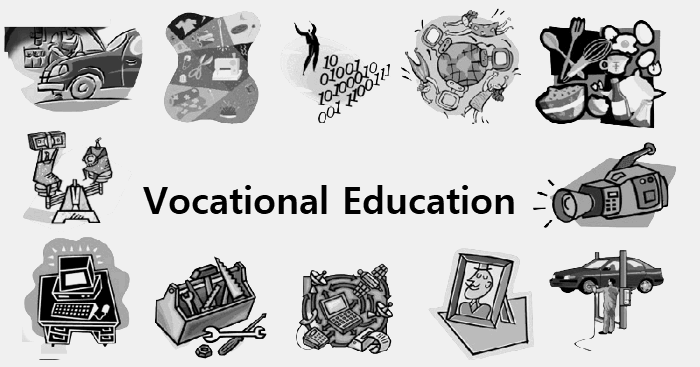
The government plays a crucial role in supporting vocational education, which is a form of education that focuses on providing students with the skills and knowledge needed for a specific trade or profession. This type of education is essential for the growth and development of a country's workforce, and it is important for the government to provide the necessary resources and support to ensure that vocational education is accessible and effective for all students.
One of the key ways in which the government supports vocational education is by providing funding for vocational schools and training programs. This funding can be used to purchase equipment, hire qualified instructors, and cover other expenses related to running the programs. This is important, as it allows vocational schools to offer high-quality training to students, and it also helps to ensure that the programs are affordable and accessible to all students, regardless of their financial situation.
Another important role of the government in supporting vocational education is through the development and implementation of policies and regulations that govern the vocational education system. This can include setting standards for the curriculum, training programs, and facilities, as well as establishing accreditation and certification processes. These policies and regulations ensure that vocational education programs are of high quality and that they meet the needs of students, employers, and the broader community.
In addition to funding and policy, the government also supports vocational education by providing tax incentives for businesses that invest in vocational training for their employees. This can include tax credits for businesses that provide training to their employees, and it can also include grants and other forms of financial support for businesses that establish apprenticeship programs. This helps to encourage businesses to invest in the training and development of their workforce, which in turn helps to improve the skills and productivity of the workforce.
The government also plays a role in promoting vocational education to students and the general public. This can include providing information about vocational education options and programs, as well as resources and materials to help students make informed decisions about their education and career paths. This helps to increase awareness of the benefits of vocational education, and it also helps to attract more students to vocational programs.
Furthermore, the government can also support vocational education by partnering with businesses and industry organizations to align the curriculum and training programs with the current and future needs of the workforce. This can include providing job-specific training, internships, and apprenticeships to students, which will help them to gain hands-on experience in their chosen field and increase their employability after graduation.
In addition to traditional vocational education, the government can also support the development and implementation of new and emerging technologies in vocational education. For example, the government can invest in research and development of new technologies such as virtual reality, artificial intelligence, and other digital tools that can be used to enhance the learning experience for students. These technologies can provide students with new and innovative ways to learn, which can increase their engagement and interest in the subject, and also prepare them for the future workforce.
The government can also support vocational education by providing financial aid and scholarships for students who are pursuing vocational education. This can help to make vocational education more affordable and accessible for students from low-income families or other disadvantaged groups, and it can also help to attract more students to vocational programs.
Finally, the government can support vocational education by encouraging the integration of vocational education into the broader education system. This can include making vocational education an integral part of the curriculum at the primary and secondary levels, and also providing opportunities for students to pursue vocational education alongside academic education. This will help to ensure that students have a well-rounded education that prepares them for a variety of career options, and it will also help to break down the stereotypes and misconceptions surrounding vocational education.
In conclusion, the government plays a vital role in supporting vocational education and ensuring that it is accessible and effective for all students. From funding and policies to partnerships, technology integration, financial aid, and integration with other educational systems, the government's actions can help to improve the skills and productivity of the workforce and therefore the overall economy.
Key Points
- The government plays a crucial role in supporting vocational education by providing funding for vocational schools and training programs, developing and implementing policies and regulations, providing tax incentives, and promoting vocational education.
- The government can support vocational education by partnering with businesses and industry organizations to align the curriculum and training programs with the current and future needs of the workforce.
- The government can also support the development and implementation of new and emerging technologies in vocational education.
- The government can provide financial aid and scholarships for students who are pursuing vocational education to make it more affordable and accessible for students from low-income families or other disadvantaged groups.
- The government can encourage the integration of vocational education into the broader education system, making it an integral part of the curriculum at the primary and secondary levels and providing opportunities for students to pursue vocational education alongside academic education.
- The government can also support vocational education by creating and promoting initiatives that encourage employers to invest in the training and development of their workforce through apprenticeship programs, job-specific training, and internships.
- The government can support vocational education by providing resources and materials to help students make informed decisions about their education and career paths, and by increasing awareness of the benefits of vocational education among the general public.
- The government can also play a role in promoting and supporting lifelong learning opportunities, which can help to ensure that the workforce remains adaptable and competitive in a rapidly changing job market.
- The government can also support vocational education by investing in research and development of new technologies such as virtual reality, artificial intelligence, and other digital tools that can be used to enhance the learning experience for students.
- The government can also support vocational education by providing incentives for businesses to recruit and hire graduates of vocational programs, which will help to increase the employability of graduates and also help to address skills shortages in specific industries.
- One of the key ways in which the government can support vocational education is by working with industry groups and employers to establish industry standards and certification processes that ensure that vocational education programs are preparing students with the skills and knowledge required for the workforce.
- The government can also support vocational education by investing in infrastructure and facilities that are needed to support vocational education programs, such as workshops, labs, and training centers.
- The government can also support vocational education by creating and implementing programs that provide additional support and resources for students who may face barriers to accessing vocational education, such as students from disadvantaged backgrounds, students with disabilities, and adult learners.
- The government can also support vocational education by providing resources and materials to help students make informed decisions about their education and career paths, and by increasing awareness of the benefits of vocational education among the general public.
In conclusion, the government plays an important role in supporting vocational education. By providing funding, implementing policies and regulations, providing tax incentives, and promoting vocational education, the government helps to ensure that vocational education is accessible and effective for all students. It also helps to improve the skills and productivity of the workforce, which is essential for the growth and development of a country's economy.
Also Read:
- Apprenticeships: How to Get Started
- Careers in Trades: Opportunities and Salaries
- Choosing a Vocational Career: What to Consider
- Importance of Vocational Education in Today's Job Market
- Online Vocational Programs: Advantages and Disadvantages
- Preparing for a Vocational Career: Tips and Strategies
- Role of Government in supporting Vocational Education
- The Advantages of Vocational Education for High School Students
- The Future of Vocational Education: Emerging Trends and Technologies
- The Role of Vocational Education in Economic Development
- The Vocational Education and Training System
- Types of Vocational Programs: Which One is Right for You?
- Vocational Education and Entrepreneurship
- Vocational Education and Industry 4.0
- Vocational Education and Job Placement
- Vocational Education and Lifelong Learning
- Vocational Education and Skills Shortage: How to bridge the gap
- Vocational Education and the Future of Work
- Vocational Education and the Gig Economy
- Vocational Training vs. College: What's the Difference?






